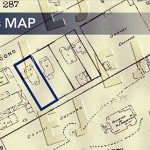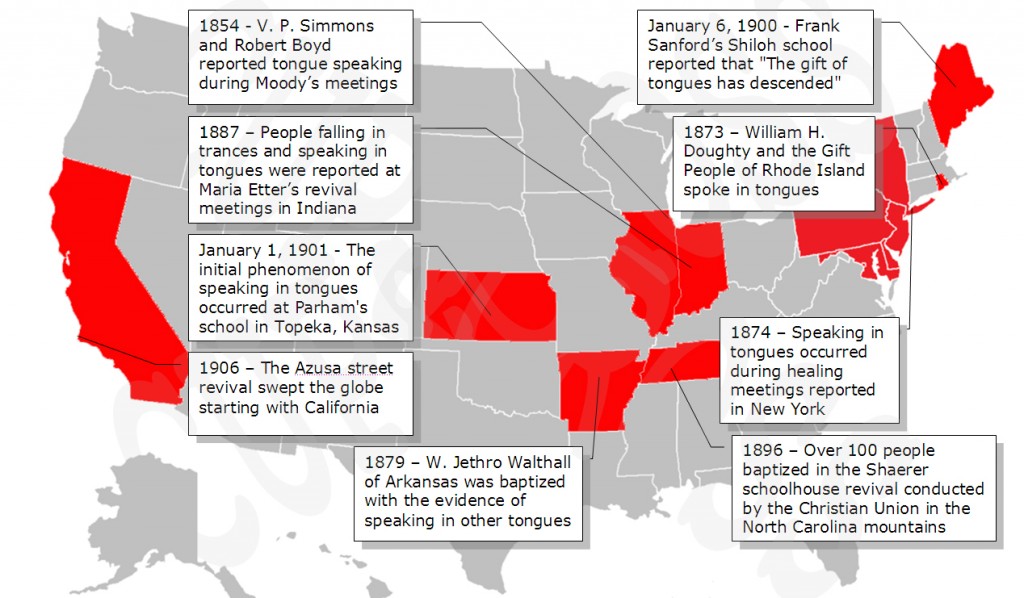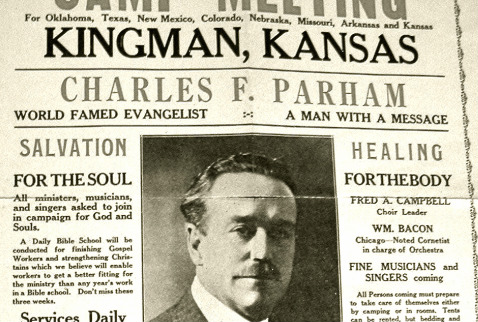The Forgotten Azusa Street Mission: The Place where the First Pentecostals Met
For years, the building on Azusa Street has also been an enigma. Most people are familiar with the same three or four photographs that have been published and republished through the years. They show a rectangular, boxy, wood frame structure that was 40 feet by 60 feet and desperately in need of repair. Seymour began his meetings in the Mission on April 15, 1906. A work crew set up a pulpit made from a wooden box used for shipping shoes from the manufacturer to stores. The pulpit sat in the center of the room. A piece of cotton cloth covered its top. Osterberg built an altar with donated lumber that ran between two chairs. Space was left open for seekers. Bartleman sketched seating as nothing more than a few long planks set on nail kegs and a ragtag collection of old chairs.
What the new sources have revealed about the Mission, however, is fascinating. The people worshiped on the ground level — a dirt floor, on which straw and sawdust were scattered. The walls were never finished, but the people whitewashed the rough-cut lumber. Near the door hung a mailbox into which tithes and offerings were placed since they did not take offerings at the Mission. A sign greeted visitors with vivid green letters. It read “Mene, Mene, Tekel, Upharsin” (Daniel 5:25, kjv), with its Ns written backwards and its Ss upside down. Men hung their hats on exposed overhead rafters where a single row of incandescent lights ran the length of the room.
These sources also reveal that the atmosphere within this crude building — without insulation or air conditioning, and teeming with perspiring bodies — was rank at best. As one writer put it, “It was necessary to stick one’s nose under the benches to get a breath of air.”
Several announced that the meetings were plagued by flies. “Swarms of flies,” wrote one reporter, “attracted by the vitiated atmosphere, buzzed throughout the room, and it was a continual fight for protection.”
A series of maps drawn by the Sanborn Insurance Company give a clear picture of the neighborhood. The 1888 map discloses that Azusa Street was originally Old Second Street. The street was never more than one block in length. It ended at a street paving company with piles of coal, along with heavy equipment. A small house, marked on the map by a “D” for domicile, sat on the front of the property with the address of 87. (See highlighted section.) A marble works business specializing in tombstones stood on the southeast corner of Azusa Street and San Pedro. Orange and grapefruit orchards surrounded the property. On the right of the map a Southern Pacific railroad spur is clearly visible. The City Directory indicates that the neighborhood was predominantly Jewish, though other names were mixed among them.
A second map of the property was published in 1894. Old Second Street had become Azusa Street, and the address had been changed to 312. The house had been moved further back on the property where it served as a parsonage. The dominant building at 312 Azusa Street was the Stevens African Methodist Episcopal Church. At the front of the building a series of tiny parallel lines on the map mark a staircase that stood at the north end of the building providing entry to the second floor, the original sanctuary.
The only known photograph of the church from this period shows three interesting features. First, it shows the original staircase. Second, and less obvious, the original roofline had a steep pitch. Third, three gothic style windows with tracery lines adorned the front wall.
By 1894, the citrus groves had largely disappeared. On the southern side they were replaced by lawn. The smell of orange blossoms and the serenity of the orchard were rapidly being replaced by the banging of railroad cars and the smell of new lumber. A growing number of boarding houses and small businesses, including canneries and laundries, were moving into the immediate area by this time. The property marked “YARD” on the map is the beginning of the lumberyard that soon came to dominate the area. The City Directory reveals fewer Jewish names, and more racial and ethnic diversity in the neighborhood, including African Americans, Germans, Scandinavians, and Japanese.
Stevens AME Church occupied the building at 312 Azusa Street until February 1904 when the congregation dedicated a new brick facility at the corner of 8th and Towne and changed their name to First AME Church. Before the congregation could decide what to do with the property on Azusa Street, however, an arsonist set the vacant church building on fire. The structure was greatly weakened, and the roof was completely destroyed. The congregation decided to turn the building into a tenement house. They subdivided the former second-floor sanctuary into several rooms separated by a long hallway that ran the length of the building. The stairs were removed from the front of the building and a rear stairwell was constructed, leaving the original entry hanging in space. The lower level was used to house horses and to store building supplies, including lumber and nails.
In 1906, a new Sanborn Map was published. (See 1906 map.) The building was marked with the words “Lodgings 2nd, Hall 1st, CHEAP.” The transition of the neighborhood had continued. The marble work still occupied the southeast corner of Azusa Street and San Pedro, but a livery and feed supply store now dominated the northeast corner. A growing lumberyard to the south and east of the property now replaced the once sprawling lawn. A Southern Pacific railroad spur curved through the lumberyard to service this business.
The Apostolic Faith, the newspaper of the Azusa Street Mission between September 1906 and June 1908, later referred to the nearby Russian community. Many of these recent immigrants were employed in the lumberyard. They were not Russian Orthodox Christians as one might guess; they were Molokans — “Milk drinkers.” This group had been influenced by some of the 16th-century Reformers. They did not accept the dairy fasts of the Orthodox Church. They were Trinitarians who strongly believed in the ongoing guidance of the Holy Spirit. Demos Shakarian, grandfather of the founder of Full Gospel Business Men’s International, was among these immigrants who were led to Los Angeles through a prophetic word given in 1855.
Henry McGowan, later an Assemblies of God pastor in Pasadena, was a member of the Holiness Church at the time. He was employed as a teamster. He timed his arrival at the nearby lumberyard so he could visit the Mission during its afternoon services.
This map suggests why some viewed the Mission as being in a slum. A better description would be an area of developing light industry.
In April 1906, when the people who had been meeting at the house at 214 North Bonnie Brae Street were forced to move, they found the building at 312 Azusa Street was for sale. The photograph below taken about the time that the congregation chose to move into the building shows the “For Sale” sign posted high on the east wall of the building, as well as the rear of the tombstone shop. Seymour, pastor of the Azusa Street Mission, and a few trusted friends met with the pastor of First AME Church and negotiated a lease for $8 a month.
An early photograph reveals what the 1906 version of the map indicates. The pitched roof had not been replaced. The building had a flat roof. The staircase that had stood at the front of the building had been removed.
In a sense, this building suited the Azusa Street faithful. They were not accustomed to luxury. They were willing to meet in the stable portion of the building. The upstairs could be used for prayer rooms, church offices, and a home for Pastor Seymour.
Articles of incorporation were filed with the state of California on March 9, 1907, and amended May 19, 1914. The church negotiated the purchase of the property for $15,000 with $4,000 down. It was given the necessary cash to retire the mortgage in 1908. The sale was recorded by the County of Los Angeles on April 12, 1908.
110 Years ago, William J. Seymour was baptized with the Holy Spirit
After starting a fast on April 6, 1906 in Los Angeles, the small group experienced what would become the first baptism with the Holy Spirit at the Azusa Street Revival. Several more followed shortly. William J. Seymour himself was baptized 110 years ago on April 12, 1906.
On the seventh, which was Good Friday, Seymour and his followers leased an abandoned church property at 312 Azusa Street and begin cleaning it up. Easter was on April 15, 1906 when they held their very first Pentecostal service at Azusa Street. The rest is history…
110 Years ago, the Azusa Street Revival Began with a Fast
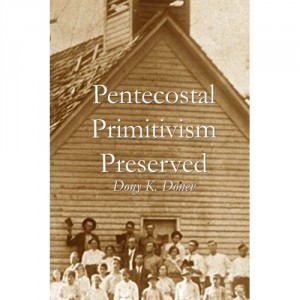
On April 6, 1906 William J. Seymour and the faithful few gathered with him at the Asberry house, decided to engage in a ten-day fast while waiting on the baptism in the Spirit. The first baptism with the Holy Spirit would occur just three days later. Seymour himself would be baptized on the sixth day of the fast and on the seventh, which was Good Friday, Seymour and his followers leased an abandoned church property at 312 Azusa Street and begin cleaning it up. Easter was on April 15, 1906 when they held their very first Pentecostal service at Azusa Street. The rest is history…
Azusa Street Chronology 110 Years Ago…

JANUARY 2, 1906 William SEYMOUR ENROLLS in Charles PARHAM’S BIBLE TRAINING SCHOOL in Houston, Texas
FEBRUARY 1, 1906 During early February 1906, William J. Seymour receives an invitation from Mrs. Julia W. Hutchins to serve as pastor of the Holiness Church congregation she has founded in Los Angeles, California.
FEBRUARY 10, 1906 SEYMOUR LEAVES the BIBLE SCHOOL
FEBRUARY 22, 1906 William J. Seymour arrives in Los Angeles, California
FEBRUARY 24, 1906 Seymour preaches his first sermon as pastor of the Holiness Church at 9th Street and Santa Fe Avenue. He continues preaching on Sunday, February 25; Tuesday, February 27; and Friday, March 2, while holding meetings at 3 p.m. each afternoon.
MARCH 4, 1906 Seymour is LOCKED OUT of the church
MARCH 7, 1906 PRAYER MEETING at 114 SOUTH UNION STREET
MARCH 12, 1906 NIGHTLY MEETINGS BEGIN at 312 N. BONNIE BRAE St.
APRIL 6, 1906 The group at the Asburry house decides to engage in a 10-day fast while they pray for the baptism in the Spirit.
APRIL 9, 1906 FIRST BAPTISM IN THE HOLY SPIRIT IN LOS ANGELES
APRIL 12, 1906 William J. Seymour receives his baptism in the Holy Spirit and speaks in tongues.
APRIL 13, 1906 On Good Friday, Seymour and his friends lease the property at 312 Azusa Street and begin cleaning it up.
APRIL 15, 1906 SEYMOUR’S FIRST SERVICE AT 312 AZUSA STREET on EASTER 1906
APRIL 17, 1906 The LA TIMES INVESTIGATES
APRIL 18, 1906 At 5:48 a.m., San Francisco, California is rocked by an earthquake. During the next 4 days, the city burns. The first report on the Azusa Street Mission appears under the title, “Weird Babel of Tongues,” in the Los Angeles Daily Times. The Mission begins to grow.
APRIL 19, 1906 Los Angeles feels two earthquakes.
APRIL 21, 1906 BARTLEMAN WRITES “THE EARTHQUAKE!!!”
Diamonds in the Rough-N-Ready Pentecostal Series (Complete)

Speaking in Tongues in America Prior to the Azusa Street Revival of 1906
April, 1906 – The Azusa street revival swept the globe starting with California
January 1, 1901– The initial phenomenon of speaking in tongues occurred at Parham’s school in Topeka, Kansas
January 6, 1900 – Frank Sanford’s Shiloh school reported that “The gift of tongues has descended”
1896 – Over 100 people baptized in the Shaerer schoolhouse revival conducted by the Christian Union in the North Carolina mountains
1887 – People falling in trances and speaking in tongues were reported at Maria Etter’s revival meetings in Indiana
1874 – Speaking in tongues occurred during healing meetings reported in New York
1873 – William H. Doughty and the Gift People of Rhode Island spoke in tongues
1854 – V. P. Simmons and Robert Boyd reported tongue speaking during Moody’s meetings
FURTHER READING:
Church of God (Cleveland, TN)
- Alive, alive! (A personal testimony)
- Church of God Primitivism
- Bulgarian Church of God
- J.W. Buckalew
- Why revival came? by Dr. Charles Conn
Azusa Street Revival of 1906
- Lucy F. Farrow: The Forgotten Apostle of Azusa
- The FORGOTTEN ROOTS OF THE AZUSA STREET REVIVAL
- Azusa Street’s Apostolic Faith Renewed
- Azusa Street Sermons
- Pentecostal Primitivism Preserved
Prior to Azusa Street Revival of 1906
- First person to speak in tongues in the Assemblies of God was William Jethro Walthall of the Holiness Baptist Churches of Southwestern Arkansas
- The Work of the Spirit in Rhode Island (1874-75)
- Speaking in Tongues in America Prior to the Azusa Street Revival
- WAR ON THE SAINTS: Revival Dawn and the Baptism of the Spirit
- How Jezebel Killed One of the Greatest Revivals Ever
Speaking in Tongues in America Prior to the Azusa Street Revival of 1906 (Diamonds in the Rough-N-Ready Series)

The Azusa street revival swept the globe starting with California
January 1, 1901– The initial phenomenon of speaking in tongues occurred at Parham’s school in Topeka, Kansas
January 6, 1900 – Frank Sanford’s Shiloh school reported that “The gift of tongues has descended”
1896 – Over 100 people baptized in the Shaerer schoolhouse revival conducted by the Christian Union in the North Carolina mountains
1887 – People falling in trances and speaking in tongues were reported at Maria Etter’s revival meetings in Indiana
1874 – Speaking in tongues occurred during healing meetings reported in New York
1873 – William H. Doughty and the Gift People of Rhode Island spoke in tongues
1854 – V. P. Simmons and Robert Boyd reported tongue speaking during Moody’s meetings
Lucy F. Farrow: The Forgotten Apostle of Azusa

Lucy F. Farrow was born in Portsmouth, VA. Unfortunately, her origins there have not been yet fully traced. Her involvement appeared around the summer of 1905 while working as governess in Parham’s home in Houston.
While in Houston, Farrow met Charles Parham, who came there from Baxter Springs, Kansas, in October 1905 and held meetings in Bryan Hall. Parham was preaching about the earlier outpouring of the Holy Spirit that had occurred in his Bethel Bible College in Topeka, Kansas, in January 1901.
Other sources claim, Lucy F. Farrow received the Holy Ghost a little bit earlier on September 6, 1905 after Parham opened up a month-long meeting in Columbus, Kansas. Along with Parham she witnessed events unfold in Zion, Illinois, where John Alexander Dowie was faltering.
Lucy Farrow was the niece of renowned black abolitionist Frederick Douglass. She was serving as pastor of a holiness church in Houston in 1905 when Charles Parham engaged her to work as a governess in his home. Farrow carried the Pentecostal embers back to Texas, on to her home state Virginia and later to Liberia. Her aptitude for igniting the supernatural gifts among others was evident at a 1906 camp meeting near Houston when some 25 seekers stood lined up in a row in front of her. When Farrow “laid hands upon them…many began to speak in tongues at once.”
Although William J. Seymour is acknowledged as the leader of the Azusa Street Revival, it was a black woman, Lucy Farrow, who provided the initial spark that ignited that revival. About the time when Seymour departed to Los Angeles in January of 1906, Lucy Farrow and J. A. Warren also arrived there independently. Other sources claim, they had been sent by Parham to help Seymour with his meetings.
Seymour began his meetings at the Santa Fe Mission on February 24, 1906 but was quickly shut down by the pastor Julia W. Hutchins on March 4, 1906 after a consultation with the South Californian Holiness Association.
The meetings then moved to 214 Bonnie Brae St., home of Richard and Ruth Asberry. As a result, Edward S. Lee was the first one was baptized in the Spirit and spoke in other tongues in the late afternoon when William J. Seymour and Lucy F. Farrow laid hands on him for healing at his house. At 7:30 p.m., the group went back to Bonnie Brae for the evening meeting and before the night was over, Jennie Evans Moore and several others joined him.
It has been said that no one associated with the prayer meeting led by Seymour had spoken in tongues until Farrow, at Seymour’s request, arrived on the scene and began laying her hands on people and seeing God fill them with the Holy Spirit as in the book of Acts. She also ministered with power across the southern United States and in Liberia in West Africa. She lived out her final years in Los Angeles, where there were reported healings and remarkable answers to prayer through her ministry.
AJ Tomlinson baptized while interpreting tongues?
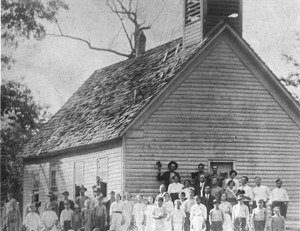 A recent covenant group rereading of the personal diary of Rev. AJ Tomlinson brought up several questions as per the exact timing of his personal baptism in the Holy Spirit.
A recent covenant group rereading of the personal diary of Rev. AJ Tomlinson brought up several questions as per the exact timing of his personal baptism in the Holy Spirit.
The first explanation proposed a problem, namely: does one have to be baptized in the Spirit with the initial evidence of speaking in tongues in order to operate the gifts of the Spirit? One specific problematic area in the discussion was the interpretation of tongues, since we know that many in the Bible prophesied without being baptized in the Spirit. A second explanation proposed that AJ Tomlinson was baptized with the Holy Spirit or at least witnessed and experienced a Pentecostal experience prior to 1906. Here are several passages from his personal diary which refer to early baptism with the Holy Spirit:
Vol. 3. p. 13 “Received the Holy Ghost about March, 1896”
Vol. 3, p. 36 August 4, 1904 “Just arrived home from Drygo, Tenn., where we held a ten days meeting. Some converted, some received the Holy Ghost.”
Vol. 3, p. 49 June 14, 1907 “Glorious results. Speaking in other tongues by the Holy Ghost.”
Vol. 3, p. 52 August 19, 1907 “One received the baptism with the Holy Ghost and spoke with other tongues.”
Last but not least, we have a detail record of a tremendous financial struggle through which AJ Tomlinson expressed deep dependence on the leadership and supplication of the Holy Spirit throughout the whole year of 1901 and forward. This record should be regarded as formational for the whole financial structuring of the upcoming church organization and its later institutionalization.
Source: http://babel.hathitrust.org/cgi/pt?id=wu.89067290775;view=1up;seq=42
Samson’s Foxes published by Rev. A.J. Tomlinson in Culberson, N.C. (1901-1902)
February 10, 2016 by Cup&Cross
Filed under Featured, News, Publication, Research
Sa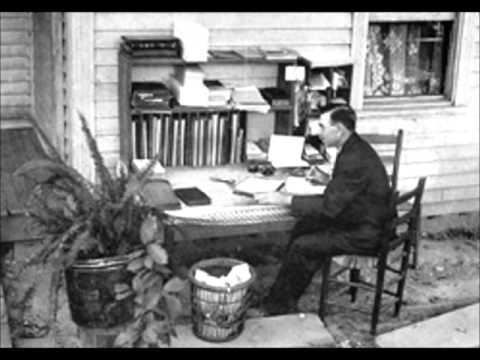 mson’s Foxes published by Rev. A.J. Tomlinson in Culberson, N.C. (January, 1901)
mson’s Foxes published by Rev. A.J. Tomlinson in Culberson, N.C. (January, 1901)
Samson’s Foxes published by Rev. A.J. Tomlinson in Culberson, N.C. (April, 1901)
Samson’s Foxes published by Rev. A.J. Tomlinson in Culberson, N.C. (August, 1901)
Samson’s Foxes published by Rev. A.J. Tomlinson in Culberson, N.C. (September, 1901)
Samson’s Foxes published by Rev. A.J. Tomlinson in Culberson, N.C. (January, 1902)
Samson’s Foxes published by Rev. A.J. Tomlinson in Culberson, N.C. (February, 1902)
Samson’s Foxes published by Rev. A.J. Tomlinson in Culberson, N.C. (March, 1902)
Samson’s Foxes published by Rev. A.J. Tomlinson in Culberson, N.C. (May, 1902)
Selected Publications by Rev. Charles Fox Parham
February 5, 2016 by Cup&Cross
Filed under Featured, News, Publication, Research
The Evelasting Gospel Charles F. Parham
Voice Crying in the Wilderness
Selected Sermons of Charles Parham
CHARLES FOX PARHAM: Founder of the Apostolic Faith
In a time when divine healing and moves of the Spirit had scarcely been heard of, Charles Parham introduced the American Church to the power available through pursuing a Spirit-filled life. He revealed to the church the life-giving power found in the baptism of the Holy Spirit that was evidenced by speaking in other tongues. He sought to bring a balance of both the intellectual and experimental to the Body of Christ: as a teacher, rooted and grounded in the Word of Truth, as well as a healing evangelist moved by compassion, commitment, and an amazing faith.
CHARLES PARHAM and the Apostolic Faith Bible College
In early 1899, Parham opened a home for divine healing. Sarah, Parham’s wife, named it “Bethel.” The purpose was to minister to the sick around the clock. Powerful teaching services were held daily while individual prayer was offered several times throughout the day and night. It was through this healing home that the Bethel Bible College in Topeka, Kansas, started and experienced a glorious batism in the Holy Ghost on January 3, 1901.
We believe that this outpouring of the Holy Ghost was the latter rain that is referred to in the Scriptures. This Bible College, founded by Parham, is still in operation today. It is now known as the Apostolic Faith Bible College, located in Baxter Springs, Kansas. No tuition has ever been charged of any student. Their room and board, along with meals is provided by the sacrifice and generous donations of Apostolic Alumni and friends. The Apostolic Faith Bible College teaches the inspired word of God and works to prepare each student for his or her ministry.
From envisioning and founding a Healing Home to establishing Bible Schools, Charles Parham studied to show himself approved unto God with a rare diligence while fervently working to prove the truth of God’s Word through the demonstration of faith. His ministry contributed to over two million conversions, and his light still shines. His story is an example for the students today. Charles Fox Parham died quietly on January 29, 1929 at the age of fifty-six, but his legacy lives on.


